Politics
Falae Claims 1999 Presidential Victory Over Obasanjo
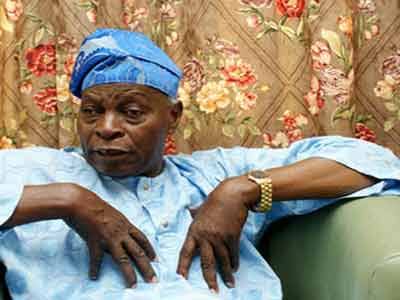
Chief Olu Falae, a former Secretary to the Government of the Federation and presidential candidate of the Alliance for Democracy (AD) and the All People’s Party (APP) in the 1999 general elections, has made a startling claim – asserting that he, not Chief Olusegun Obasanjo, won the crucial vote that ushered Nigeria back to civilian rule.
Falae, who appeared on Arise TV’s Morning Show on Thursday during special Democracy Day programming, alleged that he was the actual winner of the 1999 presidential election, but was denied his mandate through manipulation of results. The elder statesman declared that based on the legal review of the vote tallies carried out by his legal counsel, late Chief J.O.K. Ajayi, he defeated Obasanjo of the Peoples Democratic Party (PDP) by a margin exceeding one million votes.
“I was told by my lawyer, the late Chief JOK Ajayi, that I won the election by over a million votes after a meticulous assessment of the figures declared,” Falae said during the interview. “But we decided not to go to court. We were more concerned about the country returning to democracy peacefully after years of military rule.”
Falae’s unexpected revelation reopens an old political wound from Nigeria’s transitional period following the death of General Sani Abacha and the eventual assumption of office by General Abdulsalami Abubakar, who oversaw the transition to democratic governance. The 1999 elections were widely seen at the time as a product of compromise—a means to pacify aggrieved regions, particularly the South-West, following the annulment of the June 12, 1993 election presumed to have been won by MKO Abiola.
Falae’s candidacy in 1999, backed by two major opposition parties—AD and APP—was seen as an effort to appease the Yoruba people, while Obasanjo, himself a Yoruba man and former military Head of State, emerged as the PDP’s candidate with backing from the political establishment and the military elite.
“There was so much pressure not to rock the boat,” Falae told his interviewers. “We made sacrifices for democracy to return. I accepted it in good faith then, but the truth must be told: I won that election.”
Political analysts have long pointed to irregularities and compromises in the 1999 electoral process. While international observers acknowledged the election marked a turning point for Nigeria’s democratic aspirations, they also flagged concerns over lack of transparency and credible voter records.
Falae’s fresh assertions have sparked renewed debate over the legitimacy of the 1999 poll and the foundations of Nigeria’s Fourth Republic. Critics argue that the results were pre-determined by powerful political and military interests who saw Obasanjo, a former military leader and prisoner under Abacha, as a stabilizing force capable of uniting a fragile federation.
Now 85, Falae’s voice still carries weight in Nigeria’s political circles. A respected technocrat, former finance minister, and an enduring figure in Yoruba nationalism, he insists that Nigeria must revisit its democratic journey to learn from the past and ensure true accountability.
Reacting to his remarks, some Nigerians on social media expressed both sympathy and skepticism. While some lamented what they described as stolen history and a “hijacked transition,” others questioned the timing and motive behind the revelation, 26 years after the fact.
For Falae, however, the matter goes beyond personal ambition. “It’s not about me,” he said. “It’s about the truth. Nigeria deserves to know the real story behind its so-called democratic rebirth.”
As Nigeria marks another Democracy Day, Falae’s claim adds a layer of complexity to the nation’s political history – a reminder that even foundational transitions can be contested long after the ballots are counted.
Falaye regretted that since 1993, Nigeria has not had credible election, noting that although the democracy has been sustained till 1999, the conduct of elections remain a challenge.
Hallmarknews.com
Politics
BREAKING: “Serial Disrespect” Sparks Drama As Senate Order Arrest Of Tinubu’s Appointee
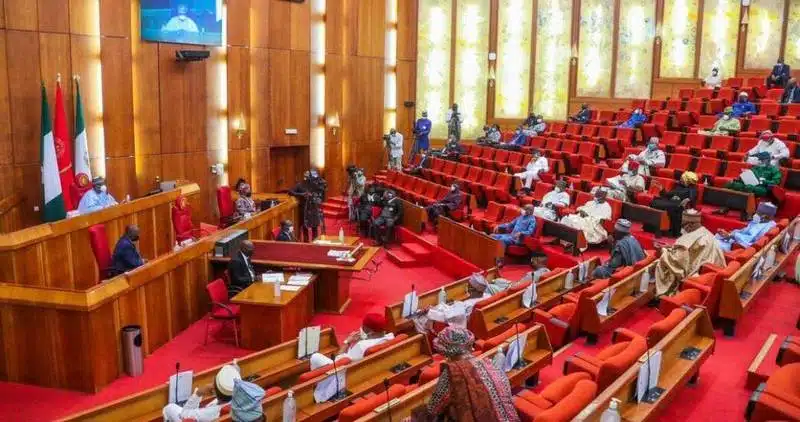
The Senate has asked President Bola Tinubu to immediately remove the Registrar General of the Corporate Affairs Commission (CAC), Hussaini Ishaq Magaji (SAN), from his office.
As reported by Nigerian Tribune, the Senate committee on finance, while passing a resolution in Abuja on Thursday, February 26, accused Magaji of failing to honour the upper legislative chamber’s invitations to account for the finances of his agency.
Senator Sani Musa, the chairman of the committee, said:
“He (Magaji) refused on so many occasions to honour our invitation to appear before this committee.
“We have issues with the reconciliation of the revenue of CAC.
“Each time we invite him, he gives us excuses.
” Magaji was appointed to this position by President Tinubu on October 13, 2023.
As the registrar-general of the CAC, Magaji is expected to work for the development and regulation of corporate affairs in Nigeria.
Meanwhile, President Tinubu on Wednesday night, February 25, formally urged the Senate to begin the process of amending the 1999 constitution to provide for the establishment of state police, declaring that Nigeria must urgently restructure its security architecture to confront terrorism, banditry and insurgency.
Speaking at an interfaith breaking of fast with the leadership and members of the Senate at the State House, Abuja, the president stated that the time had come for lawmakers to “start thinking” about embedding state policing in the constitution to enable governments at subnational levels better secure their territories.
The Nation quoted President Tinubu as saying:
“Nigeria is extremely challenged, we are facing terrorism, banditry, insurgency, but you never failed to make a right response to these calls.
“What I will ask for tonight is for you to start thinking how best to amend the Constitution to incorporate the state police for us to secure our country, take over our forests from marauders, free our children from fear.”
Politics
Opposition Leaders Urge N’Assembly To Begin Fresh Electoral Act Amendment
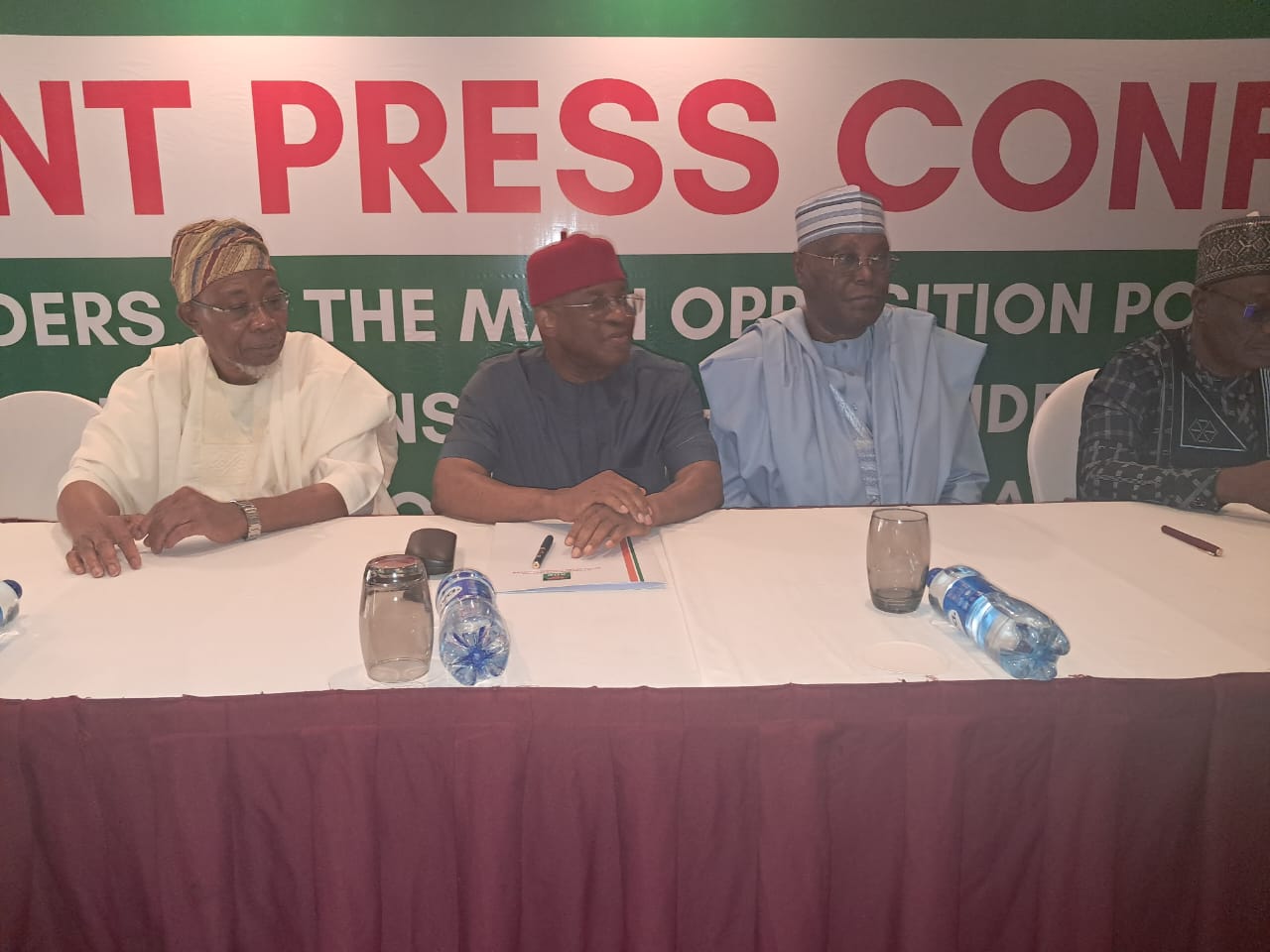
Leaders of the African Democratic Congress and the New Nigeria Peoples Party have called on the National Assembly to commence a fresh process to amend the Electoral Act.
Speaking on behalf of the opposition at a press conference in Abuja on Thursday, NNPP National Chairman, Ajuji Ahmed, urged federal lawmakers to expunge all objectionable provisions contained in the Act.
Prominent opposition figures at the meeting included former Senate President David Mark; NNPP chieftain Buba Galadima; former Vice-President Atiku Abubakar; and the 2023 presidential candidate of the Labour Party, Peter Obi.
Also in attendance at the Lagos/Osun Hall of Transcorp Hilton, Abuja, were the ADC National Secretary, Rauf Aregbesola; former Rivers State Governor Rotimi Amaechi; and the party’s National Publicity Secretary, Bolaji Abdullahi, alongside other stakeholders.
Others present included Senator Dino Melaye, former ADC National Chairman Ralph Nwosu, and former Cross River State Governor Liyel Imoke, among several dignitaries.
Politics
Assembly Confirms Popular Redeemed Pastor As Deputy Governor
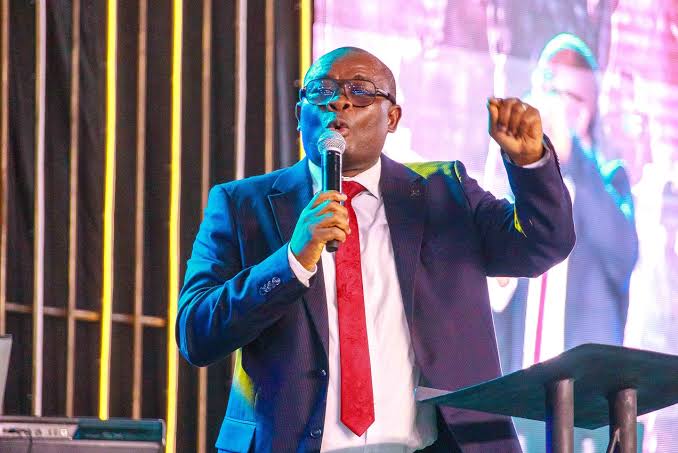
The Bayelsa state house of assembly has approved the appointment of Peter Akpe as the deputy governor of the state.
Akpe, a pastor, served as chief of staff to Douye Diri, governor of Bayelsa, prior to his nomination.
Ordained clergy by the Redeemed Christian Church of God (RCCG), Akpe has had a career spanning the civil service and politics.
He served in the Rivers and Bayelsa state civil services before transitioning fully into politics.
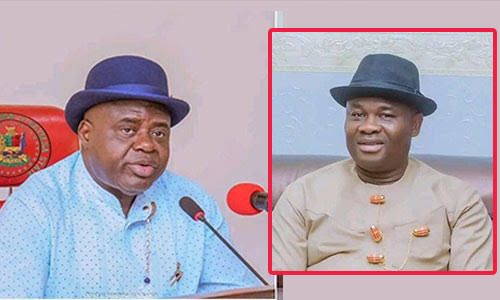
Akpe was a two-term member of the Bayelsa state house of assembly from 2011 to 2019, serving as majority leader throughout his stint in the legislature.
He also served as commissioner between 2008 and 2011 under the Seriake Dickson administration.
The approval clears the way for his swearing-in as deputy governor.
Akpe’s appointment follows the death of Lawrence Ewhrudjakpo, the former deputy governor, who passed on last December.
-

 Politics2 days ago
Politics2 days agoAssembly Confirms Popular Redeemed Pastor As Deputy Governor
-

 Foreign2 days ago
Foreign2 days agoCabinet Reshuffle: President Sacks Finance Minister
-

 Business2 days ago
Business2 days agoJUST IN: 13 Banks May Shut Down In March As CBN Confirms 20 Safe For Recapitalisation Deadline
-

 Politics12 hours ago
Politics12 hours agoBREAKING: “Serial Disrespect” Sparks Drama As Senate Order Arrest Of Tinubu’s Appointee
-

 Politics13 hours ago
Politics13 hours agoOpposition Leaders Urge N’Assembly To Begin Fresh Electoral Act Amendment
-

 Opinion12 hours ago
Opinion12 hours agoEdo State To Spend N1billion On Armoured Car For Speaker, N4.6billion On Vehicles For Lawmakers




